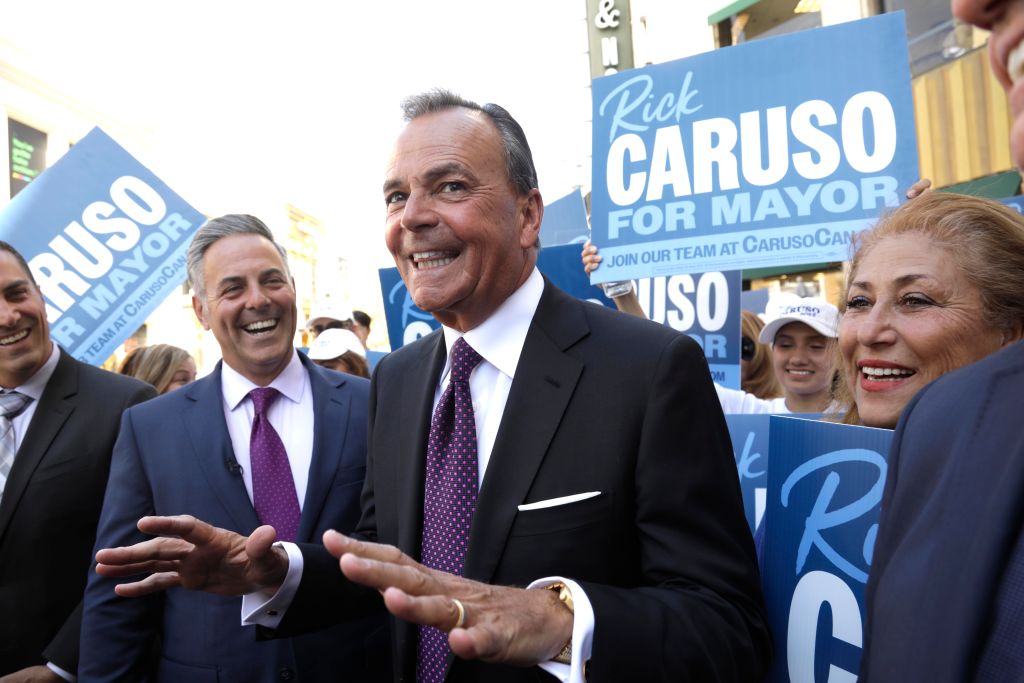
This article is part of The D.C. Brief, TIME’s politics newsletter. Sign up here to get stories like this sent to your inbox.
Tuesday’s results in California could have hardly been more unambiguous. Voters in Los Angeles narrowed the field of candidates looking to follow term-limited Mayor Eric Garcetti to a former chair of the Congressional Black Caucus and a billionaire ex-Republican who ran on a tough-on-crime, anti-homeless platform. In San Francisco, voters booted the district attorney, who ran in 2019 as a criminal-justice reformer but came to be seen as too lax in maintaining order there.
The one-two punch stopped some Democratic strategists cold. Efforts to remake the justice system in the wake of the Black Lives Matter movement have quickly collided with fears that public safety is falling by the wayside. Even in liberal havens like California, many considered what they viewed as an unacceptable surge in public disorder—wanton homeless camps, smash-and-grab burglaries, needles on sidewalks—and voted accordingly.
Republican strategists for months have been treating the 2022 midterm elections as a referendum on security, both economic and physical. Insecurity and the correlating fears and anxieties can do a number on an electorate’s psyche, and it clearly manifested that way in California, a state not exactly known for reactionary steps of late. The fact that real-estate developer Rick Caruso was leading Rep. Karen Bass by 5 percentage points was something of a shock in famously liberal Los Angeles, given Caruso’s recent history as a Republican. But Caruso was an unflinching advocate for adding 1,500 officers to the city’s police department and more broadly cleaning-up the city with its 60,000 homeless residents. (Caruso’s $39 million in out-of-pocket spending didn’t hurt, either.)
And the quick ditch of Chesa Boudin as San Francisco’s district attorney suggested voters blamed him for scenes of criminality unfolding more often in public view. While the city’s crime stats tell a more nuanced story, the perception was everything, and Boudin was on track for a 20-percentage-point drubbing. That sends a clear warning to Los Angeles’s district attorney, George Gascon, who soon could face his own recall effort over a similar reputation as soft-on-crime.
It’s easy to over-extrapolate national implications from local results, but the pattern has been emerging for some time. On the East Coast, both New York City Mayor Eric Adams and New York Governor Kathy Hochul have seen their polling numbers collapse, with three-quarters of Gotham residents telling pollsters they fear for their personal safety. National polls indicate shrinking support for both policing reform policies and the Black Lives Matter movement itself. And the recent slate of mass shootings has also taken its toll on the nation’s mood.
For his part, President Joe Biden has been consistently warning against the liberal slide of his Democratic Party when it comes to policing. In his State of the Union speech, he absolutely rejected any embrace of efforts to defund the police. As homicide rates have spiked across the country, he has sought to crack down on guns and spend more on police. And his White House has been working with party organs to reframe the conversation away from far-left policies like Medicare for All and blanket student-loan forgiveness and back toward a message that connects in the suburbs.
That doesn’t mean the broader Democratic Party is always listening to its leader. Take Iowa, where Democrats are hoping to unseat Senator Chuck Grassley in November. On Tuesday night, Mike Franken, a retired Navy admiral, defeated Abby Finkenauer, a former House member with a track record of drawing support from independents, by running to her left. Defeating Grassley in that solidly-red state was always going to be a tough lift, but having a never-before-elected nominee makes the math even tougher. And just last month, Democrats in Pennsylvania went with an unconventional contender, John Fedderman, as their Senate nominee for a rare open seat, even as the party insiders had their hearts—if not their votes—with moderate Rep. Conor Lamb.
But despite those wins by progressives, there are signs the broader Democratic electorate is undulating back toward a pre-2020 mentality, one that allowed Biden to capture the nomination amid perhaps the most progressive and diverse presidential field ever assembled. As Democrats look around and see undeniable scenes of chaos on the streets, in schools, and even in Washington, their desire for normalcy seems triggered. It’s one thing to support a liberalized policing policy in theory, but it’s another to see elected officials supporting such shifts amid fears that crime and homelessness are surging in places long perceived as immune to those safety-net failures.
Tuesday provided the clearest sign yet that Democrats are in a NIMBYish mood—and it may save them from deep defeats this November.
Make sense of what matters in Washington. Sign up for the D.C. Brief newsletter.
More Must-Reads From TIME
- The 100 Most Influential People of 2024
- Coco Gauff Is Playing for Herself Now
- Scenes From Pro-Palestinian Encampments Across U.S. Universities
- 6 Compliments That Land Every Time
- If You're Dating Right Now , You're Brave: Column
- The AI That Could Heal a Divided Internet
- Fallout Is a Brilliant Model for the Future of Video Game Adaptations
- Want Weekly Recs on What to Watch, Read, and More? Sign Up for Worth Your Time
Write to Philip Elliott at philip.elliott@time.com